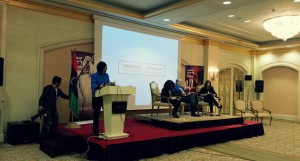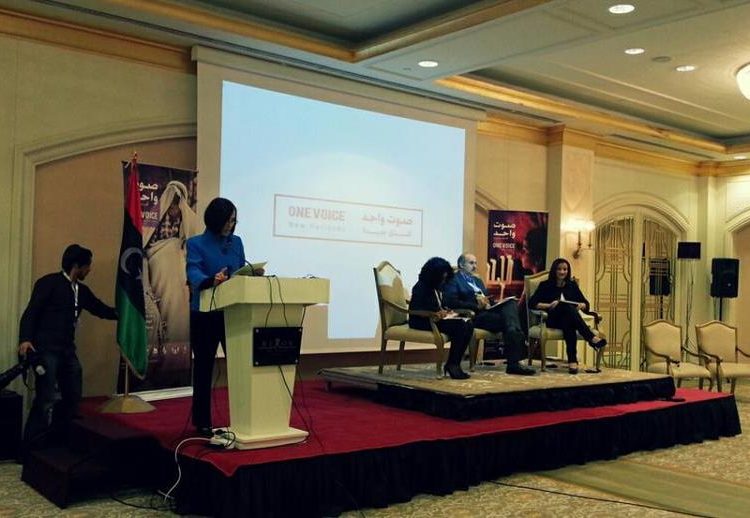By Sami Zaptia.

Tripoli, 27 January:
I was honoured to be asked to take part in a panel discussion on day one of . . .[restrict]the One Voice 2013 women’s conference that was held on 26-27 January in Tripoli.
Our moderator was Farah Barqawiy and my co-panelists were Intisar Azzouz a prominent civil society activist and Heba Elshibani journalist and blogger. We were asked to speak for a maximum of 10 minutes.
After briefly introducing myself, I thanked the organizers for giving me the opportunity to speak for the second time at the One Voice conference having also had the pleasure of speaking at the 2011 conference. I also congratulated the organizers for continuing with this annual conference dedicated to issues on women.
I was particularly pleased to be asked to speak about women youth and the media, topics that I regard as axiomatic to the future of the new Libya.
There is no denying the importance of the role of Libya’s youth in the February 17th Revolution, just as there is no denying the role of women in the Revolution. These were in effect the drivers of Libya’s revolution – inseparable and fundamental.
With regards to the importance of the role of the media during the Revolution, it was plain to see how it could and was manipulated, by both sides, in both negative and positive ways, depending on your political points of view.
Qaddafi and his regime always knew the importance of the media and that is why they had controlled it totally during his 42 year reign. During the Revolution, this became even more important as the regime tried to totally dominate the news emanating out of Libya.
We saw how far he was prepared to go to control the news agenda, including fabricating news and cutting off the internet in an attempt to suppress the social media output of the opposition.
However, this proved to be an unachievable task in view of both satellite telephones and satellite internet systems locally and the satellite TV stations based abroad Doha, Tunisia and Cairo. Nor could he control the secret bloggers such as Numidia, FGM etc etc .
The great lengths and cost that the former regime went to, including attempts to block the Aljazera satellite TV signals, in order to control the media, the media agenda and the news underscores the importance of this sector for any sector of the community.
Post Revolution
Therefore, it goes without say that today post liberation, the voice of the youth needs to be represented in the media. It needs to act as an opposition but also as a balance to the generational gap that often exists within the media which is often controlled by an older generation.
A generational gap in outlook would cause a chasm between Libya’s large youthful population and the usually older generation of managers that control the media and the media agenda.
This gap has often elsewhere led to the disenchantment, resentment and disillusionment of the youthful class that has led to social friction that if left to fester will lead to serious social and political rifts within society. Rifts that are sometimes unbridgeable.
Almost exactly the same could be said of women. Having played their role during the Revolution there is the danger that the male population will turn round to women with a tap on the back and a thank you very much for your effort, now go back to your pre-revolution role of running the home and accepting some peripheral jobs – but keep out of real leadership roles. That is a big danger for the post revolution Libyan woman.
Therefore the post-revolution young Libyan woman needs to impose herself and her outlook on the new Libya. Her proactive role in the media will be paramount. She needs to have a presence – a real presence – in order to have a hand in controlling and creating the media agenda so that her voice is heard.
Just as the Libyan woman had a role in the Revolution – she must continue her role post revolution in shaping the new Libya. If this is to be a Libya for all Libyans, men and women, old and young, armed and unarmed – the young Libyan women must have a leading role in the new free, independent media.
Because media shapes ideas and societies – it helps create and control the agenda by publicizing what is said and what is not.
If we – in the so called new free Libya – are serious about building a new, equitable, democratic, transparent society built upon the rule of law – all sectors of Libyan society must have a full role in that Libya.
A free, independent, vibrant, capable media is a pillar stone of a real democracy. A democracy that imposes and insists on transparency and accountability of the ruling class: legislature, executive and judiciary – needs an active media.
This media must be composed of all the sectors of Libyan society including women, who make up half of our society and youth, that make-up well over half of Libyan society.
A society where not all its members have a voice is a suppressed society, and Arab Spring nations know only too well what long years of suppression lead too!
There can be no real democracy. There can be no real equality. There can be no real development and progress in Libya – if youth and women do not have a real role in its development and progress.
And it is up to the various NGOs such as those organizing today’s conference to keep pushing and fighting for the rights of women and youth in society – including a voice in the local media.
No one hands out rights. Rights must be constantly fought for and defended. That is if we want a free, democratic, progressive Libya. [/restrict]







